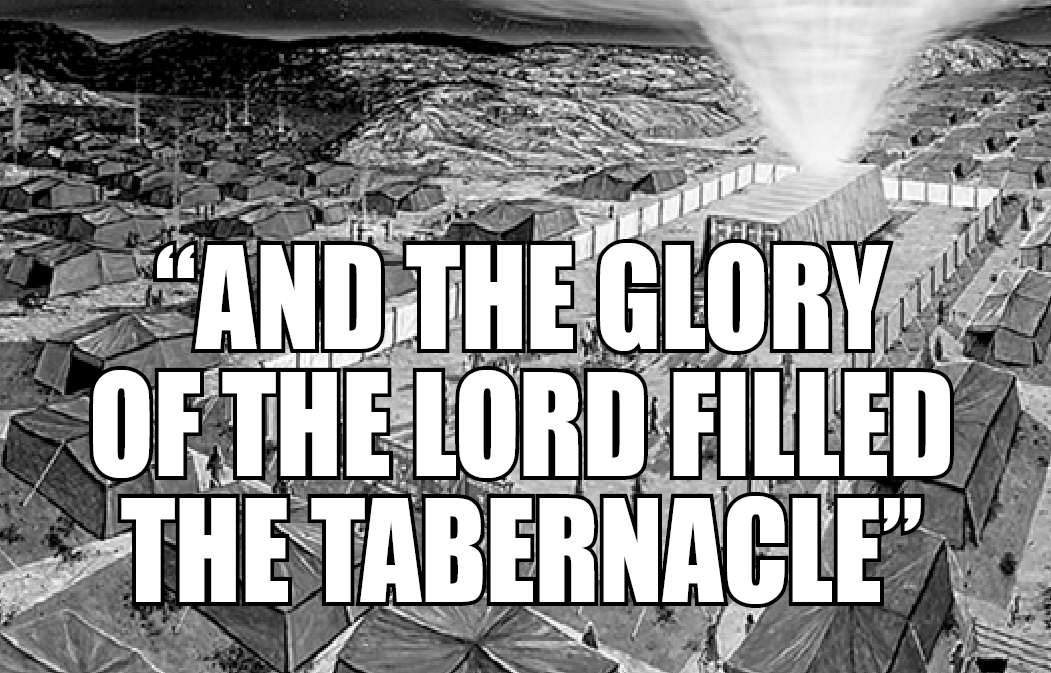

“And the Glory of the Lord Filled the Tabernacle”
Pr. Philip P. Sam
In the Old Testament the phrase ‘glory of God’ has a great significance especially in the life of Israel. We see Yahweh revealing his glory to the Israelites in many ways at numerous occasions. What exactly is the meaning of this phrase? How did God reveal his glory to the Israelites? How did the Old Testament writers describe the glory of God? How did the Israelites understand the glory of God? A more pertinent question for us is how was the revelation of the glory of God important for the Israelites?
In the Old Testament ‘Khavod’ is the Hebrew word used for glory. The meaning of ‘Khavod’ literally is “to be heavy” or “weight” and it is used as a technical term for God’s manifest presence. It means honor and dignity and in terms of glory and splendor refers to God. Rolf Rendtorff describes glory as that aspect of Yahweh that could be perceived by people and in which he himself is revealed in his power. Khavod however is not a well defined concept in the OT. It is best to treat the term as something that points to the godliness of God as it appeared in his manifestations and his revelations. Thus the term “glory of God” has to be understood as a term that represents the nature, character, power and the majesty of God which was revealed through various manifestations in the life of Israel. A synopsis of the varied application of the phrase “glory of God” in the life of Israelites would give us a fair picture of the meaning and significance of the phrase. Let us look at the different aspects of the glory of God revealed to the Israelites.
Glory of God revealed in the name of God: In the Hebrew thought name displays the character of a person. Thus when God proclaimed his names like El-Shaddai, El-Royi, Yahweh and so on, God was revealing his glory. That the name of God was very much related to his glory is evident in Psalms 8:1; 29:2; 66:2; 79:9; 96:8. The proclamation of God’s name before Moses when he asked God to show his glory also illustrates this reality. There Yahweh makes his goodness pass by Moses, proclaiming his name and explaining his character (Ex 33:19).
The name Yahweh: The progressive revelation of the nature of God in the book of Genesis through the proclamation of his names, El-Shaddai, El-Elyon, El-Royi, Jehovah-Jireh so on was the unveiling of the glory of God. Taken in this sense the revelation of God’s name as Yahweh to Moses through the experience of the burning bush was a significant act of displaying the glory of God. Though the name of God as Yahweh was known before as we see in the book of Genesis, yet in disclosing the name Yahweh to Moses, God was actually committing himself as the personal God of Israel. The name Yahweh did not express any attribute of God, or describe God as to His essence; but it described Him in this relation to Israel- “I will be with thee.” God was committing himself to Moses and Israel as their personal God eager to enter into a covenant relationship with them. It was in the personal commitment of God to Moses and eventually to Israel, the name Yahweh became unique and first of its kind of revelation.
In the theophanic manifestation of God as the fire engulfing the bush yet not consuming it, God was beginning to display his glory to Moses and Israelites in a more concrete (understood by the senses) and personal way. In this disclosure of the consuming glory of God, the thorny desert bush (representing Israel) was not consumed, but became the channel of displaying God’s glory. In the rest of the history of Israel God was displaying his glory in and through Israel.
A study of the Old Testament would make it clear that Israel’s history and purpose was closely related to the revelation of the glory of God. In other words, Israel’s existence as a priestly nation among the whole earth depended upon their understanding of the nature of Yahweh (glory of Yahweh). God’s purpose in this self-revelation was that the Israelites would know him and follow his nature. An illustration of this could be seen in the command of God, “…therefore be holy for I am holy” (Levi 11:45). Thus the revelation of the glory of God has to be seen with this purpose of making the Israelites follow the nature of God.
The glory of Yahweh was revealed in the tabernacle and displayed through the acts of Yahweh in the history of Israel. In this revelation of his glory, God was progressively moving from revelation of his glory in Israel to the eventual filling of the whole earth with his glory.
Glory as the manifest presence of God: In the concrete understanding of the Old Testament Khavod means a fiery phenomenon from which radiance shines forth. Thus glory of God in the wilderness journey of Israel meant terrifying display of God’s power in mount of Sinai and the cloud of God’s presence in the tent of meeting. A similar manifestation of God’s glory is seen by Isaiah and Ezekiel in their vision of God throne. This awesome expression of Yahweh’s glory was necessary for the Israelites to understand the holy and powerful nature of God.
Glory of God revealed in the cloud: The term “glory of God” is first used in Exodus 16:7 in relation to the complaint of the Israelites against Moses and Aaron regarding the lack of provisions during their wilderness journey. Moses tells the people that they will see the glory of God in the morning and know that their complaint is not against their leaders but against God. What Moses was trying to communicate to the Israelites was that the presence of God, signified by the manifestation of the “glory of God”, was accompanying them in their wilderness journey. This demonstration of the glory of God was also tied to the miracle of providing food for the Israelites. Thus, God’s glory was related to the expression of the nature of God as the provider and sustainer of his people. Israel’s existence as a priestly nation of God was founded upon these revelations of God’s nature as the guide, protector and sustainer of the Israelites.
Glory of God revealed in the Tabernacle: For the people of Israel the tent of meeting or the tabernacle (mishkhan-meaning the place of God’s dwelling) was the place where God revealed his glory and gave his law and guidance (Exodus 40; Leviticus 9:23). This manifest presence of God is said to accompany Israel during the wilderness period. However after settling in Canaan, the Israelites took the Ark of God as an assurance of the presence of God even when the covenant was trampled and subverted by them. This is illustrated by I Samuel 4 which describes the defeat of Israel at the hands of the Philistines and the capture of the Ark. This event was described by the wife of Priest Eli’s son Phinehas as Ichabod which means “The glory has departed from Israel”. The Ark was brought back later to be housed in the Temple.
Glory of God in the Temple: King Solomon placed the ark of God in the magnificent temple which was filled with the glory of God at the time of its dedication (1 Chronicles 7:1-3). Solomon confessed during the dedication of the Temple that even though God has chosen to establish his name in the temple, the heavens cannot contain the glory of God (1 Kings 8:27). However we see that in the later times the Temple took more prominence in the life of Israelites than obedience to the commands in the Torah (Jeremiah 7). This subverting of the covenant of God and trusting in the temple as an assurance of the presence of God eventually led to the downfall of Jerusalem and the temple of God. The glory of God departing from the Temple was seen by prophet Ezekiel (Ez 11:23).
Glory of God fills the whole earth: The prophetic literatures describe the glory of God in relation to the eschatological (things that would happen in the last days) vision of the whole earth being filled with glory of God. This is especially evident in Isaiah’s prophecies (Is 6:3; 40:5; 62:1,2) and the prophecies of Ezekiel about the eschatological temple. The glory of God seen as departing from the temple in Jerusalem eventually was seen by Ezekiel to return in the eschatological temple (Ezekiel 43).
In the New Testament, the glory of God was revealed in a more concrete way in the person of Jesus Christ. John the Apostle writing the gospel of John testifies, “The word became flesh and tabernacle among us… We beheld his glory, the glory of the one and only begotten of the Father” (John 1:14). And again John testifies in his first epistle, “That which was from the beginning, which we have heard, which we have seen with our eyes, which we have looked upon, and our hands have touched, concerning the Word of life…” (1 John 1:1) The glory of God displayed in various ways in the Old Testament was eventually manifested in the flesh and dwelt among us, to be heard, to be seen closely and to be touched! In Jesus God was expressing his glory in the most tangible and concrete way.
Theological Significance: God revealed his glory in the life of Israelites with the purpose of making them his own people, a people devoted to his covenant. If Israelites have to follow the nature and holiness of God then they must see his nature revealed in his glorious presence. Thus the life and character of Israelites was very much related to their understanding of the glory of God. Their self-understanding and future depended upon the power and might of God revealed in the glorious presence of God.
Talking about a manifestation of God’s glory today, we need to consider the glory of God displayed in the manifestation of his love in the person of Jesus Christ and his death upon the cross. God revealed his nature in a more expressive way by becoming flesh and dwelling among us. The awesome glory of Yahweh displayed to the Israelites could be grasped with these words, “And so terrifying was the sight that Moses said, I am exceedingly afraid and trembling (Hebrews 12:21).” In Jesus the eternal Yahweh was displaying his glory more expressly. What an amazing display of God’s glory! In becoming flesh and living among us God was displaying his nature and character more fully.
God’s glory today has to be centered upon the work of the Holy Spirit in bringing transformation in a disciple’s life. Today the Holy Spirit has been poured into the hearts of disciples for them to experience and understand the presence of God. The Holy Spirit teaches and guides us into all truth related to the character of Jesus and his kingdom. The Holy Spirit is working in us to enable us to work for the extension of His kingdom, a kingdom which will be filled with his glory as was seen by prophet Ezekiel. What a great privilege we have today to be vessels carrying the glory and the presence of God!
Do we truly understand the significance of God’s glory today? What do we really mean when we talk about the glory of God today? What is the role of the Holy Spirit today in our churches and in our personal life? If only we could understand the significance of the amazing privilege we have today to behold the glory of God in the person of the Holy Spirit!






